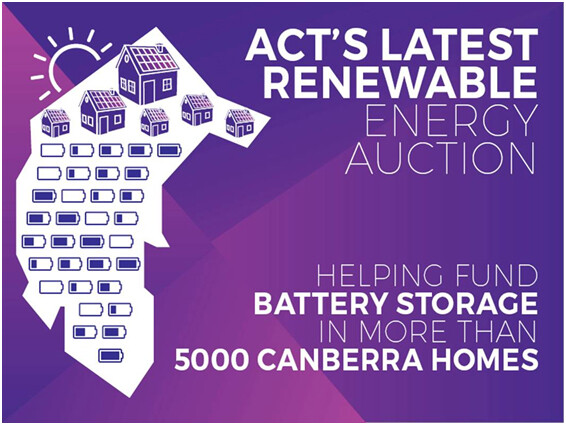
The ACT government’s Next Generation Energy Storage (Next Gen) program, initially launched in 2016, is one of the most ambitious battery storage incentive schemes in Australia, aiming to subsidise the installation of batteries for roughly 5,000 homes and small businesses.
The program has $25 million in funding and is targetting the install of 36MW in capacity. A mid-term review of the program in March 2019 showed that they had subsidised over 600 batteries and were accepting over 200 applications per year.
How the ACT battery rebate (Next Gen) works
The Next Gen scheme currently offers a rebate of 50% of the battery price up to a maximum of $3,500.
To give you an idea, the below table details some of the more popular batteries under the scheme and the applicable rebate.
| Usable Capacity | Continuous Output | Rebate | |
| Tesla Powerwall 2 | 13.5 kWh | 5 kW | $3,500 |
| LG RESU10 | 8.8 kWh | 5 kW | $3,500 |
| Alpha-ESS SMILE T-10 | 15kWh | 10 kW | $3,500 |
| BYD B-Box LVS | 3kWh | 3.33 kW | ~$2,000 |
Like the federal solar rebate (STC scheme) the installer accesses the rebate on your behalf and is able to offer a point of sale price reduction. You can look at battery offers from some of the pre-qualified installers in the scheme through Solar Choice’s comparison portal.
Compare battery quotes in the ACT now.
Eligibility for ACT’s battery rebate
To receive the rebate you must meet the following 4 criteria:
- In the ACT area including Hall, Tharwa and Oaks
- New battery system must be coupled with solar panels
- Be connected to the grid (off-grid installations are not eligible)
- A new system that has not already received a rebate from the Next Gen scheme
How the ACT selects pre-qualifed installers
 The NextGen program is an auction-based incentive scheme, where different entities ‘bid in’ under a government-run tender process for the right to offer the incentive to their customers. The eligible systems and providers have all been vetted by the government for quality, reliability, reputation and ability to deliver on promises.
The NextGen program is an auction-based incentive scheme, where different entities ‘bid in’ under a government-run tender process for the right to offer the incentive to their customers. The eligible systems and providers have all been vetted by the government for quality, reliability, reputation and ability to deliver on promises.
You can view live battery pricing on Solar Choice’s website from installers who are pre-qualified under the Next Gen Scheme.
Compare battery quotes in the ACT now.
How does this change ROI for a battery system in the ACT?
Solar Choice has developed and published an advanced calculator to help Australians calculate their savings, payback period and ROI for their own circumstances. Inputting into this calculator a likely household scenario for the ACT with an electricity rate of 20c per kWh and an average daily usage of 30kWh we have calculated the below scenarios:
| Before ACT Rebate | After ACT Rebate | ||||||
| Solar Size | Battery | Usable Capacity | Savings | Estimated Cost | Payback Period | Estimated Cost | Payback Period |
| 6.6 kWh | Tesla Powerwall 2 | 13.5 kWh | $1,308 p.a. | $18,625 | 12.7 years | $15,125 | 10.6 years |
| 6.6 kWh | LG Chem RESU6 | 5.9 kWh | $1,437 p.a. | $11,500 | 8.4 years | $8,035 | 6.3 years |
Other Benefits of a Battery Storage System
Reducing your carbon footprint
By storing and using surplus solar energy, households can get close to using 100% of their power from renewable sources. Simple grid-connected solar (only) systems still rely on 50%+ of their electricity coming from the grid. Reducing demand for grid power will accellerate the energy transition and reduce the need for Australia’s many coal-fired power plants.
Backup power in a blackout
Although the ACT electricity network has been fairly stable, the ability for households to keep the lights and fridge on during a blackout can be an important factor when deciding whether to invest in a solar battery. Products such as the LG Chem or Tesla Powerwall have an inbuilt battery inverter which enables them to charge during a blackout, and effectively can provide backup power for days or weeks if needed.
Additional income with Reposit
Canberra is home to battery management system developer Reposit Power, whose software platform allows battery system owners to sell their stored energy into the grid at a premium during high wholesale spot price events. Although these price events are somewhat rare (a few times a year), it can increase the savings you will make from your battery and improve the payback period.
Get started by comparing battery quotes online today
Since 2008 our knowledge and sophisticated software has allowed over 300,000 Australian households and businesses to make a well-informed choice on their solar & battery installer.
Want more info? Check out these resources
Compare solar & battery storage quotes
Read our article: Are home solar batteries worth it in 2021?
Solar & battery storage in the ACT: Things to consider
Check out our Calculator Resource Library
See current & historic solar system price ranges for each capital city: Solar Choice’s PV Price Index
© 2019 Solar Choice Pty Ltd
- APsystems Battery Review: An Independent Assessment by Solar Choice - 18 December, 2025
- Running Cost of Air Conditioners – Explained - 7 October, 2025
- Air Conditioner Rebate South Australia: What You Need to Know - 19 September, 2025